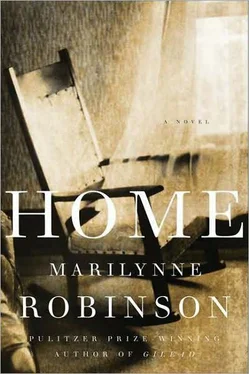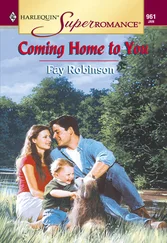The next day there was one more card. It was addressed in print so crude it might have been a child’s. She saw it because the mailman came early, before Jack would have expected him. She took the card up to his room and handed it to him. He glanced at it and his color rose, but he slipped it unopened into the book he was reading, and said nothing to her except, “Thank you, Glory. Thank you.”
AFTER A FEW DAYS SHE MIGHT FIND HIM SITTING IN THE PORCH, reading a magazine. And sometimes, if she was busy in the kitchen, he would bring his magazine to the kitchen table and read it there. A stray, she thought, learning the terms of domestication. Testing the comforts, weighing the costs. So she was tactful, careful to seem unsurprised. Once when she opened a cookbook on the table he said, “I hope you’ll tell me if I’m in the way.”
“Not at all. I appreciate the company.” She had been waiting for the chance to tell him that.
“Thanks,” he said. “I don’t really want to keep to myself so much. It’s just a habit.”
IT WAS IN FACT A RELIEF TO HAVE SOMEONE ELSE IN THE HOUSE. And it was interesting to watch how this man, gone so long, noticed one thing and another, as if mildly startled, even a little affronted, by all the utter sameness. She saw him put his hand on the shoulder of their mother’s chair, touch the fringe on a lamp-shade, as if to confirm for himself that the uncanny persistence of half-forgotten objects, all in their old places, was not some trick of the mind. Nothing about that house ever did change, except to fade or scar or wear. Miracles of thrift in their grandparents’ generation had meant that the words “free and clear” could be spoken over the house and all it contained by the time it came into the young hands of their father. Those words blessed the stodginess and the shabbiness. All that big, crowding furniture and all that prim and doubtful taste commemorated heroic discipline and foresight, which could be, and must never be, undone by bringing other standards to bear than respectability and serviceability. Their parents often told them how fortunate they were to have all their needs supplied, while their neighbors fitted out their lives as best they could on layaway and the installment plan. The Boughtons bought outright the big wooden radio and the upright piano and the electric refrigerator and stove, because the grandparents in their remarkable providence had left them a number of debt-free acres ten miles out of town which they rented to a farmer for a mutually agreeable sum. So even the things they acquired were in effect gifts from beyond the grave, since, having no needs, they could enjoy certain pleasures and conveniences free and clear. No sooner than their neighbors did, of course. Thrift that was second nature to them in any case was reinforced by care not to seem as prosperous as they were, and was pleasantly coincident with a fondness for familiar things. Why should a pastor’s family run the risk of ostentation? Why should a family with eight rambunctious children bother owning anything that could be damaged? They sat on the arms of their mother’s overstuffed chair while she read to them, and they hung over the back of it, and they pinched and plucked at its plushy hide. If the nib of a feather poked through, they would pull it out and play with it, a dry little plume of down, sometimes unbroken. As they listened to the story they would turn and turn the painted vellum lampshade till the rim of it was soiled and the stems of the four nosegays on its four sides were nearly worn away. No matter that there were paths in the rugs, no matter that the big plate spoons were out at elbow with use and polishing.
She learned the word “waft” sitting in her mother’s chair, breathing on a feather. Jack had come into the room, and the stir of air had floated it out of her hand. In those days the boys called her Glory B. or Glory Be or Glory Bee or Glory Hallelujah or Runt or Pigtails. Sometimes instead of Grace and Glory they had called their little sisters Justification and Sanctification, which came near irritating their father. But in general her brothers had ignored her, Jack not so completely as the others. He had stood in the doorway that evening and watched the feather circle against the ceiling in the air he brought in with him, and then he had reached up and caught it lightly in his hand and given it back to her. “It just wafted away,” he said. She might have been seven, so he would have been twelve. He was himself already then, solitary when he could be, gentle when the mood was upon him, a worry to them all as often as he was out of sight. Then there were those other years, after even Grace was gone, those tense years only she and her mother and father had lived through together in that house, when they lost the habit of mentioning Jack by name. She thought more often now, with Jack in the house, of that freckled girl sitting at the kitchen table, shy and bold at once, ignoring what was said to her, impatient to go home. That girl and her baby.
A MONTH BEFORE JACK AND TEDDY LEFT FOR SCHOOL, Grace had gone to live with Hope in Minneapolis so that she could study piano with a real teacher. They had all been instructed by Mrs. Sweet, a soft-bodied woman with a petulant smirk who was very deft at smacking hands without actually interrupting the performance of a scale or an etude. She sat on the bench beside them, reeking of lily-of-the-valley, and turned an injured look on the keyboard. Alert as a toad, Hope said, and quick as a toad, too. Whack! when a note offended, and then the return to sullen watchfulness, then again Whack! Six of them soldiered through, played their recitals, and emerged at the end of high school modestly competent and relieved to have one more tedious initiation into adulthood behind them. Sometimes Jack went along to lessons with Teddy, to laugh with him afterward about the horrible Mrs. Sweet. But Grace actually liked piano. She practiced more than she needed to and learned more than was exacted of her. Once she told her parents, weeping, that the hand smacking distracted her, so their mother went to speak to Mrs. Sweet, who asked, indignant, “How else will she improve?” But from then on she restrained herself, barely, when Grace played and vented her pedagogical method on Glory.
Hope, who was newly married, brought her sister-in-law on a visit to Gilead. That lady heard Gracie playing and was charmed, and mentioned the benefits for such a gifted child of life in Minneapolis. Glory still remembered the day and hour that thought settled itself in the minds of her family. All of them looked at Grace as if some ring or amulet had been discovered that identified the foundling as a royal child. It would be wonderful, Hope said, and their mother relented, and bags were packed, and Glory sat in her room, absorbing the fact that there was no argument to be offered, no appeal to be made. It was Jack who noticed her. He said, “Poor Pigtails will be all alone.” When he saw he had brought tears to her eyes, he said, “Sorry,” and smiled, and tousled her hair.
It might have been those words that allowed her to believe for years that a special bond existed between them, that she understood him as others could not. They were the unexceptional children, she thought — slighted, overlooked. There was no truth in this notion. Jack was exceptional in every way he could be, including, of course, truancy and misfeasance, and yet he managed to get by on the cleverness teachers always praised by saying “if only he would put it to some good use.” As for herself, she was so conscientious that none of her A’s and A-pluses had to be accounted for otherwise than as the reward of diligence. She was good in the fullest and narrowest sense of the word as it is applied to female children. And she had blossomed into exactly the sort of adult her childhood predicted. Ah well.
Читать дальше












